Analyzing IHRM Issues and the Harvard Model for UK Businesses in Japan
VerifiedAdded on 2022/12/23
|10
|2956
|1
Report
AI Summary
This report examines the critical aspects of International Human Resource Management (IHRM) for UK companies considering call center operations in Japan. It begins by outlining the cultural and environmental factors that UK companies must navigate, including language barriers, differing norms, values, religious beliefs, political views, economic and legal environments, environmental considerations, and technological variations. The report then delves into the specific issues faced by UK companies in Japan, such as shortages of skilled managers, compliance with local laws and regulations, the need for effective management changes, leadership development, workforce training, workplace diversity, employee benefits and packages, recruitment and retention of talented employees, adaptation to technological innovations, and compensation structures. The analysis highlights the importance of effective HRM for creating a unique workplace culture, understanding company expectations, promoting diversity, strengthening employee training, and reducing employee uncertainty. Finally, the report discusses the applicability of the Harvard model for HRM in the context of UK businesses operating in Japan, emphasizing the importance of stakeholder interests and situational factors in shaping HRM policies.
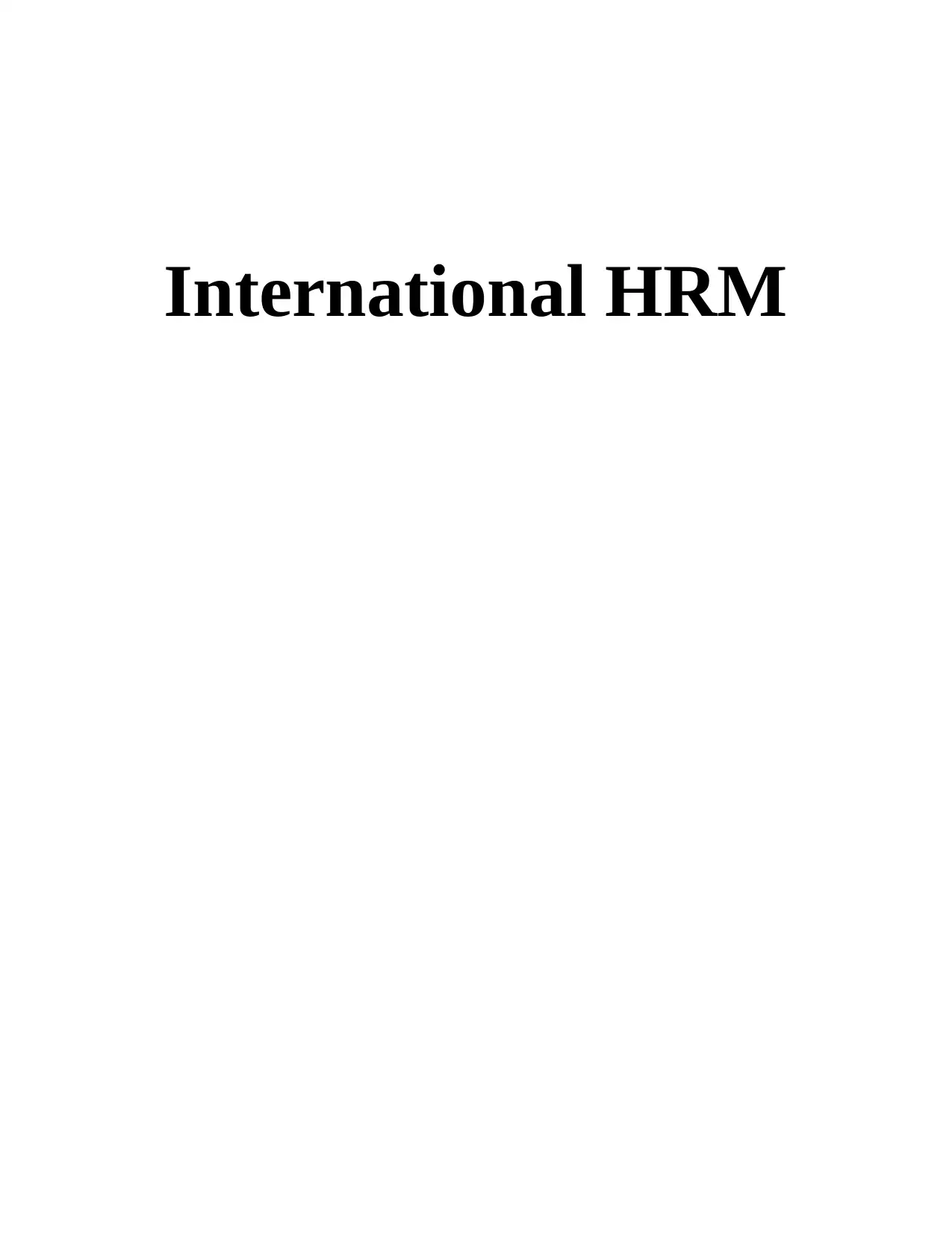
International HRM
Paraphrase This Document
Need a fresh take? Get an instant paraphrase of this document with our AI Paraphraser
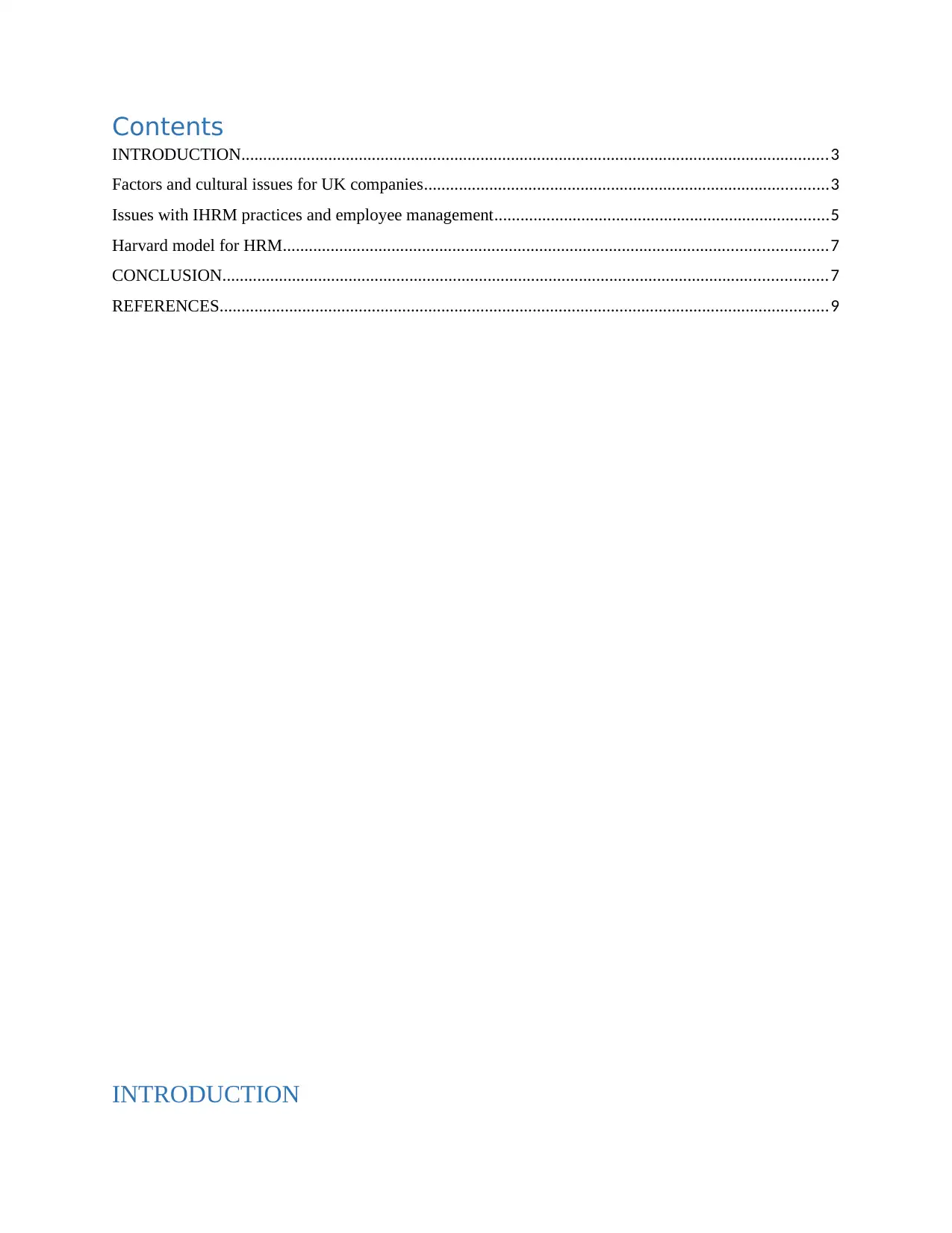
Contents
INTRODUCTION.......................................................................................................................................3
Factors and cultural issues for UK companies.............................................................................................3
Issues with IHRM practices and employee management.............................................................................5
Harvard model for HRM.............................................................................................................................7
CONCLUSION...........................................................................................................................................7
REFERENCES............................................................................................................................................9
INTRODUCTION
INTRODUCTION.......................................................................................................................................3
Factors and cultural issues for UK companies.............................................................................................3
Issues with IHRM practices and employee management.............................................................................5
Harvard model for HRM.............................................................................................................................7
CONCLUSION...........................................................................................................................................7
REFERENCES............................................................................................................................................9
INTRODUCTION
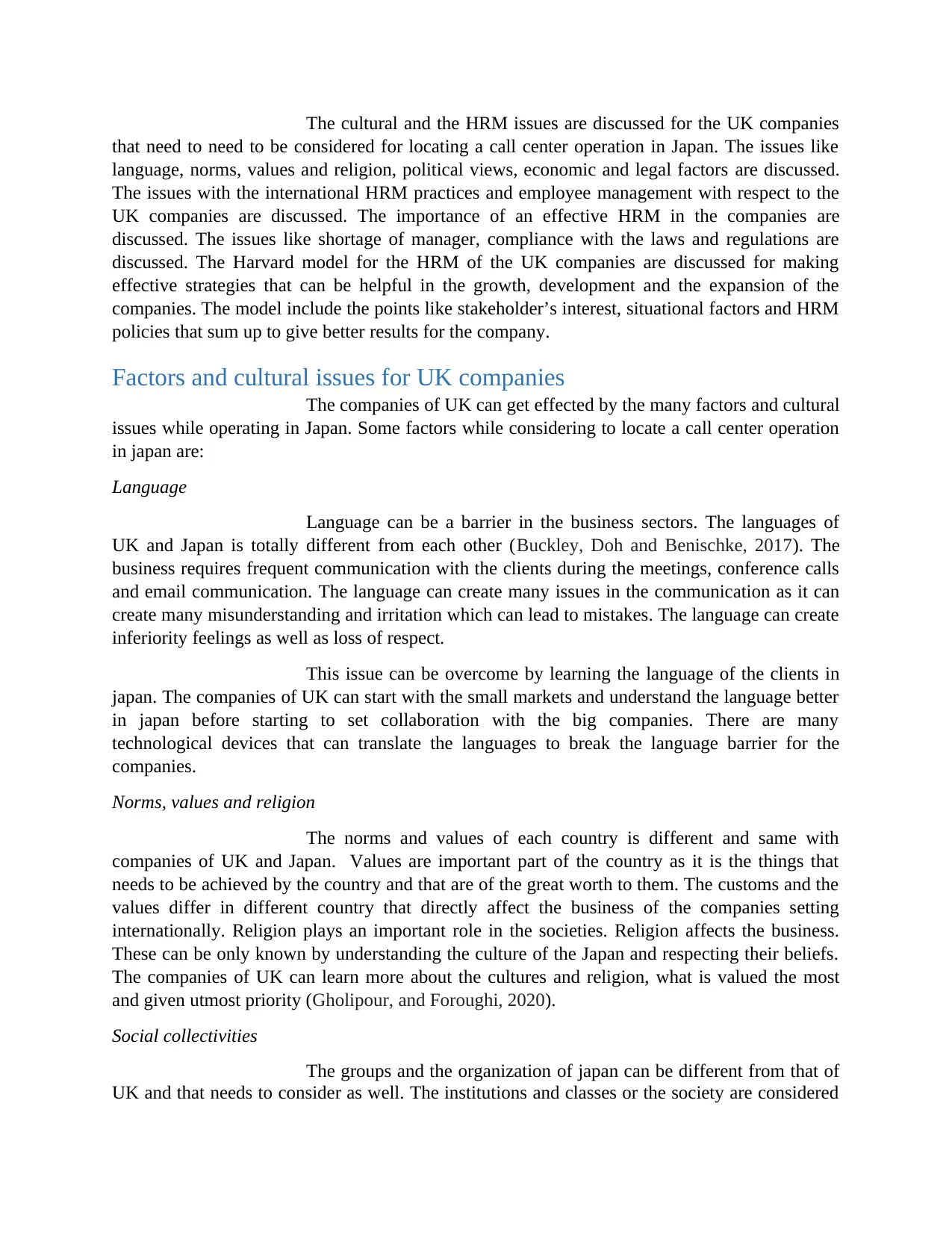
The cultural and the HRM issues are discussed for the UK companies
that need to need to be considered for locating a call center operation in Japan. The issues like
language, norms, values and religion, political views, economic and legal factors are discussed.
The issues with the international HRM practices and employee management with respect to the
UK companies are discussed. The importance of an effective HRM in the companies are
discussed. The issues like shortage of manager, compliance with the laws and regulations are
discussed. The Harvard model for the HRM of the UK companies are discussed for making
effective strategies that can be helpful in the growth, development and the expansion of the
companies. The model include the points like stakeholder’s interest, situational factors and HRM
policies that sum up to give better results for the company.
Factors and cultural issues for UK companies
The companies of UK can get effected by the many factors and cultural
issues while operating in Japan. Some factors while considering to locate a call center operation
in japan are:
Language
Language can be a barrier in the business sectors. The languages of
UK and Japan is totally different from each other (Buckley, Doh and Benischke, 2017). The
business requires frequent communication with the clients during the meetings, conference calls
and email communication. The language can create many issues in the communication as it can
create many misunderstanding and irritation which can lead to mistakes. The language can create
inferiority feelings as well as loss of respect.
This issue can be overcome by learning the language of the clients in
japan. The companies of UK can start with the small markets and understand the language better
in japan before starting to set collaboration with the big companies. There are many
technological devices that can translate the languages to break the language barrier for the
companies.
Norms, values and religion
The norms and values of each country is different and same with
companies of UK and Japan. Values are important part of the country as it is the things that
needs to be achieved by the country and that are of the great worth to them. The customs and the
values differ in different country that directly affect the business of the companies setting
internationally. Religion plays an important role in the societies. Religion affects the business.
These can be only known by understanding the culture of the Japan and respecting their beliefs.
The companies of UK can learn more about the cultures and religion, what is valued the most
and given utmost priority (Gholipour, and Foroughi, 2020).
Social collectivities
The groups and the organization of japan can be different from that of
UK and that needs to consider as well. The institutions and classes or the society are considered
that need to need to be considered for locating a call center operation in Japan. The issues like
language, norms, values and religion, political views, economic and legal factors are discussed.
The issues with the international HRM practices and employee management with respect to the
UK companies are discussed. The importance of an effective HRM in the companies are
discussed. The issues like shortage of manager, compliance with the laws and regulations are
discussed. The Harvard model for the HRM of the UK companies are discussed for making
effective strategies that can be helpful in the growth, development and the expansion of the
companies. The model include the points like stakeholder’s interest, situational factors and HRM
policies that sum up to give better results for the company.
Factors and cultural issues for UK companies
The companies of UK can get effected by the many factors and cultural
issues while operating in Japan. Some factors while considering to locate a call center operation
in japan are:
Language
Language can be a barrier in the business sectors. The languages of
UK and Japan is totally different from each other (Buckley, Doh and Benischke, 2017). The
business requires frequent communication with the clients during the meetings, conference calls
and email communication. The language can create many issues in the communication as it can
create many misunderstanding and irritation which can lead to mistakes. The language can create
inferiority feelings as well as loss of respect.
This issue can be overcome by learning the language of the clients in
japan. The companies of UK can start with the small markets and understand the language better
in japan before starting to set collaboration with the big companies. There are many
technological devices that can translate the languages to break the language barrier for the
companies.
Norms, values and religion
The norms and values of each country is different and same with
companies of UK and Japan. Values are important part of the country as it is the things that
needs to be achieved by the country and that are of the great worth to them. The customs and the
values differ in different country that directly affect the business of the companies setting
internationally. Religion plays an important role in the societies. Religion affects the business.
These can be only known by understanding the culture of the Japan and respecting their beliefs.
The companies of UK can learn more about the cultures and religion, what is valued the most
and given utmost priority (Gholipour, and Foroughi, 2020).
Social collectivities
The groups and the organization of japan can be different from that of
UK and that needs to consider as well. The institutions and classes or the society are considered
⊘ This is a preview!⊘
Do you want full access?
Subscribe today to unlock all pages.

Trusted by 1+ million students worldwide
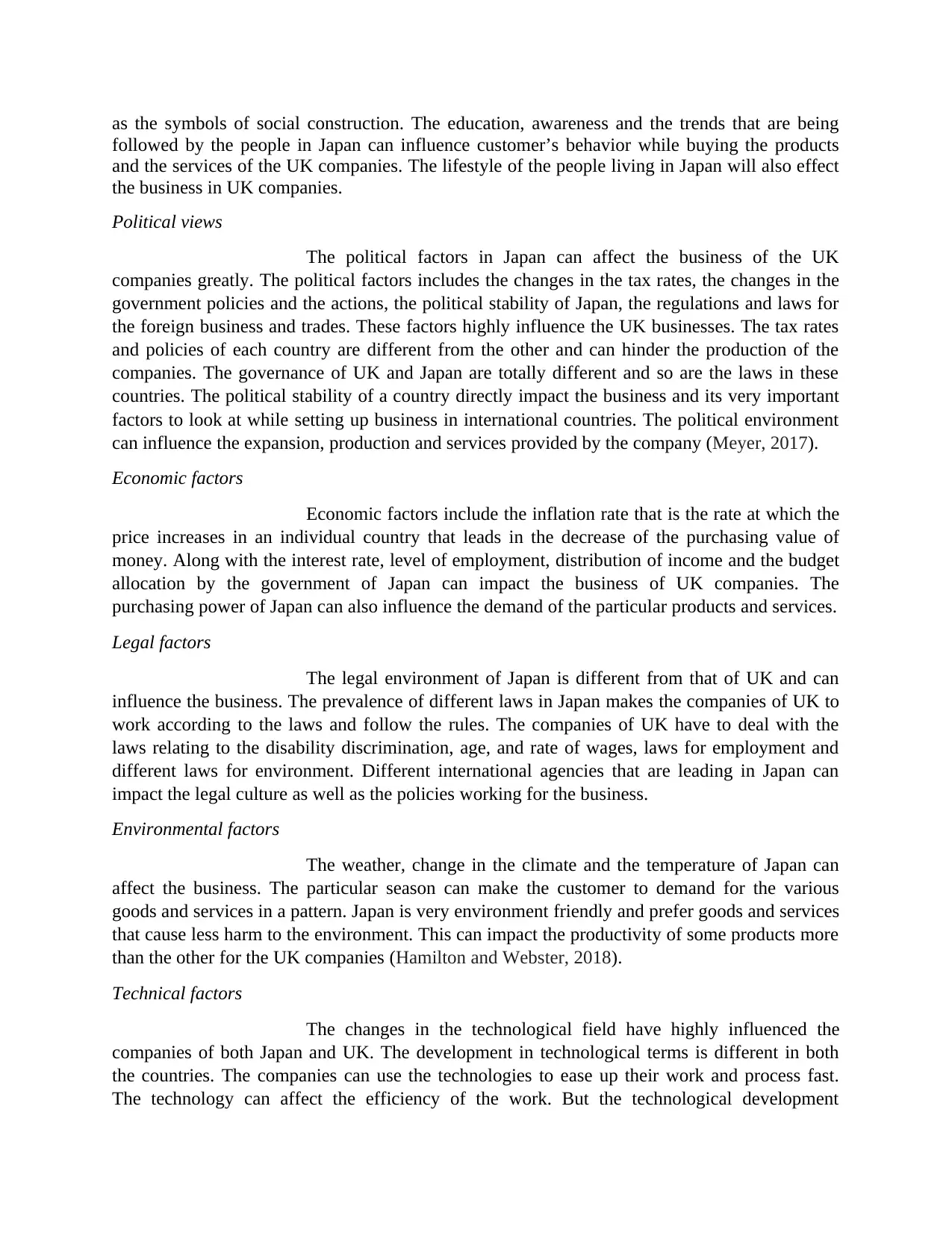
as the symbols of social construction. The education, awareness and the trends that are being
followed by the people in Japan can influence customer’s behavior while buying the products
and the services of the UK companies. The lifestyle of the people living in Japan will also effect
the business in UK companies.
Political views
The political factors in Japan can affect the business of the UK
companies greatly. The political factors includes the changes in the tax rates, the changes in the
government policies and the actions, the political stability of Japan, the regulations and laws for
the foreign business and trades. These factors highly influence the UK businesses. The tax rates
and policies of each country are different from the other and can hinder the production of the
companies. The governance of UK and Japan are totally different and so are the laws in these
countries. The political stability of a country directly impact the business and its very important
factors to look at while setting up business in international countries. The political environment
can influence the expansion, production and services provided by the company (Meyer, 2017).
Economic factors
Economic factors include the inflation rate that is the rate at which the
price increases in an individual country that leads in the decrease of the purchasing value of
money. Along with the interest rate, level of employment, distribution of income and the budget
allocation by the government of Japan can impact the business of UK companies. The
purchasing power of Japan can also influence the demand of the particular products and services.
Legal factors
The legal environment of Japan is different from that of UK and can
influence the business. The prevalence of different laws in Japan makes the companies of UK to
work according to the laws and follow the rules. The companies of UK have to deal with the
laws relating to the disability discrimination, age, and rate of wages, laws for employment and
different laws for environment. Different international agencies that are leading in Japan can
impact the legal culture as well as the policies working for the business.
Environmental factors
The weather, change in the climate and the temperature of Japan can
affect the business. The particular season can make the customer to demand for the various
goods and services in a pattern. Japan is very environment friendly and prefer goods and services
that cause less harm to the environment. This can impact the productivity of some products more
than the other for the UK companies (Hamilton and Webster, 2018).
Technical factors
The changes in the technological field have highly influenced the
companies of both Japan and UK. The development in technological terms is different in both
the countries. The companies can use the technologies to ease up their work and process fast.
The technology can affect the efficiency of the work. But the technological development
followed by the people in Japan can influence customer’s behavior while buying the products
and the services of the UK companies. The lifestyle of the people living in Japan will also effect
the business in UK companies.
Political views
The political factors in Japan can affect the business of the UK
companies greatly. The political factors includes the changes in the tax rates, the changes in the
government policies and the actions, the political stability of Japan, the regulations and laws for
the foreign business and trades. These factors highly influence the UK businesses. The tax rates
and policies of each country are different from the other and can hinder the production of the
companies. The governance of UK and Japan are totally different and so are the laws in these
countries. The political stability of a country directly impact the business and its very important
factors to look at while setting up business in international countries. The political environment
can influence the expansion, production and services provided by the company (Meyer, 2017).
Economic factors
Economic factors include the inflation rate that is the rate at which the
price increases in an individual country that leads in the decrease of the purchasing value of
money. Along with the interest rate, level of employment, distribution of income and the budget
allocation by the government of Japan can impact the business of UK companies. The
purchasing power of Japan can also influence the demand of the particular products and services.
Legal factors
The legal environment of Japan is different from that of UK and can
influence the business. The prevalence of different laws in Japan makes the companies of UK to
work according to the laws and follow the rules. The companies of UK have to deal with the
laws relating to the disability discrimination, age, and rate of wages, laws for employment and
different laws for environment. Different international agencies that are leading in Japan can
impact the legal culture as well as the policies working for the business.
Environmental factors
The weather, change in the climate and the temperature of Japan can
affect the business. The particular season can make the customer to demand for the various
goods and services in a pattern. Japan is very environment friendly and prefer goods and services
that cause less harm to the environment. This can impact the productivity of some products more
than the other for the UK companies (Hamilton and Webster, 2018).
Technical factors
The changes in the technological field have highly influenced the
companies of both Japan and UK. The development in technological terms is different in both
the countries. The companies can use the technologies to ease up their work and process fast.
The technology can affect the efficiency of the work. But the technological development
Paraphrase This Document
Need a fresh take? Get an instant paraphrase of this document with our AI Paraphraser
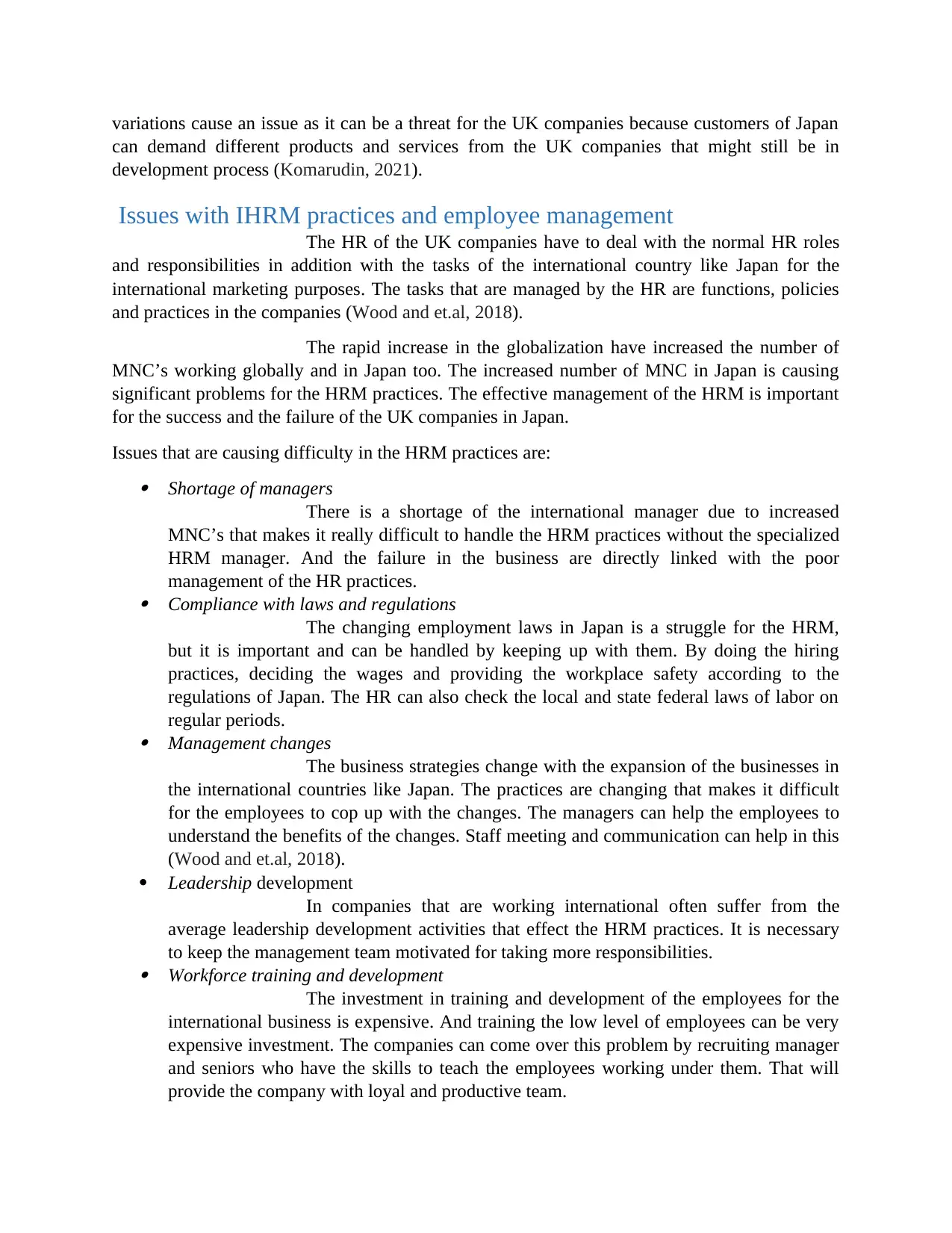
variations cause an issue as it can be a threat for the UK companies because customers of Japan
can demand different products and services from the UK companies that might still be in
development process (Komarudin, 2021).
Issues with IHRM practices and employee management
The HR of the UK companies have to deal with the normal HR roles
and responsibilities in addition with the tasks of the international country like Japan for the
international marketing purposes. The tasks that are managed by the HR are functions, policies
and practices in the companies (Wood and et.al, 2018).
The rapid increase in the globalization have increased the number of
MNC’s working globally and in Japan too. The increased number of MNC in Japan is causing
significant problems for the HRM practices. The effective management of the HRM is important
for the success and the failure of the UK companies in Japan.
Issues that are causing difficulty in the HRM practices are: Shortage of managers
There is a shortage of the international manager due to increased
MNC’s that makes it really difficult to handle the HRM practices without the specialized
HRM manager. And the failure in the business are directly linked with the poor
management of the HR practices.
Compliance with laws and regulations
The changing employment laws in Japan is a struggle for the HRM,
but it is important and can be handled by keeping up with them. By doing the hiring
practices, deciding the wages and providing the workplace safety according to the
regulations of Japan. The HR can also check the local and state federal laws of labor on
regular periods.
Management changes
The business strategies change with the expansion of the businesses in
the international countries like Japan. The practices are changing that makes it difficult
for the employees to cop up with the changes. The managers can help the employees to
understand the benefits of the changes. Staff meeting and communication can help in this
(Wood and et.al, 2018).
Leadership development
In companies that are working international often suffer from the
average leadership development activities that effect the HRM practices. It is necessary
to keep the management team motivated for taking more responsibilities.
Workforce training and development
The investment in training and development of the employees for the
international business is expensive. And training the low level of employees can be very
expensive investment. The companies can come over this problem by recruiting manager
and seniors who have the skills to teach the employees working under them. That will
provide the company with loyal and productive team.
can demand different products and services from the UK companies that might still be in
development process (Komarudin, 2021).
Issues with IHRM practices and employee management
The HR of the UK companies have to deal with the normal HR roles
and responsibilities in addition with the tasks of the international country like Japan for the
international marketing purposes. The tasks that are managed by the HR are functions, policies
and practices in the companies (Wood and et.al, 2018).
The rapid increase in the globalization have increased the number of
MNC’s working globally and in Japan too. The increased number of MNC in Japan is causing
significant problems for the HRM practices. The effective management of the HRM is important
for the success and the failure of the UK companies in Japan.
Issues that are causing difficulty in the HRM practices are: Shortage of managers
There is a shortage of the international manager due to increased
MNC’s that makes it really difficult to handle the HRM practices without the specialized
HRM manager. And the failure in the business are directly linked with the poor
management of the HR practices.
Compliance with laws and regulations
The changing employment laws in Japan is a struggle for the HRM,
but it is important and can be handled by keeping up with them. By doing the hiring
practices, deciding the wages and providing the workplace safety according to the
regulations of Japan. The HR can also check the local and state federal laws of labor on
regular periods.
Management changes
The business strategies change with the expansion of the businesses in
the international countries like Japan. The practices are changing that makes it difficult
for the employees to cop up with the changes. The managers can help the employees to
understand the benefits of the changes. Staff meeting and communication can help in this
(Wood and et.al, 2018).
Leadership development
In companies that are working international often suffer from the
average leadership development activities that effect the HRM practices. It is necessary
to keep the management team motivated for taking more responsibilities.
Workforce training and development
The investment in training and development of the employees for the
international business is expensive. And training the low level of employees can be very
expensive investment. The companies can come over this problem by recruiting manager
and seniors who have the skills to teach the employees working under them. That will
provide the company with loyal and productive team.
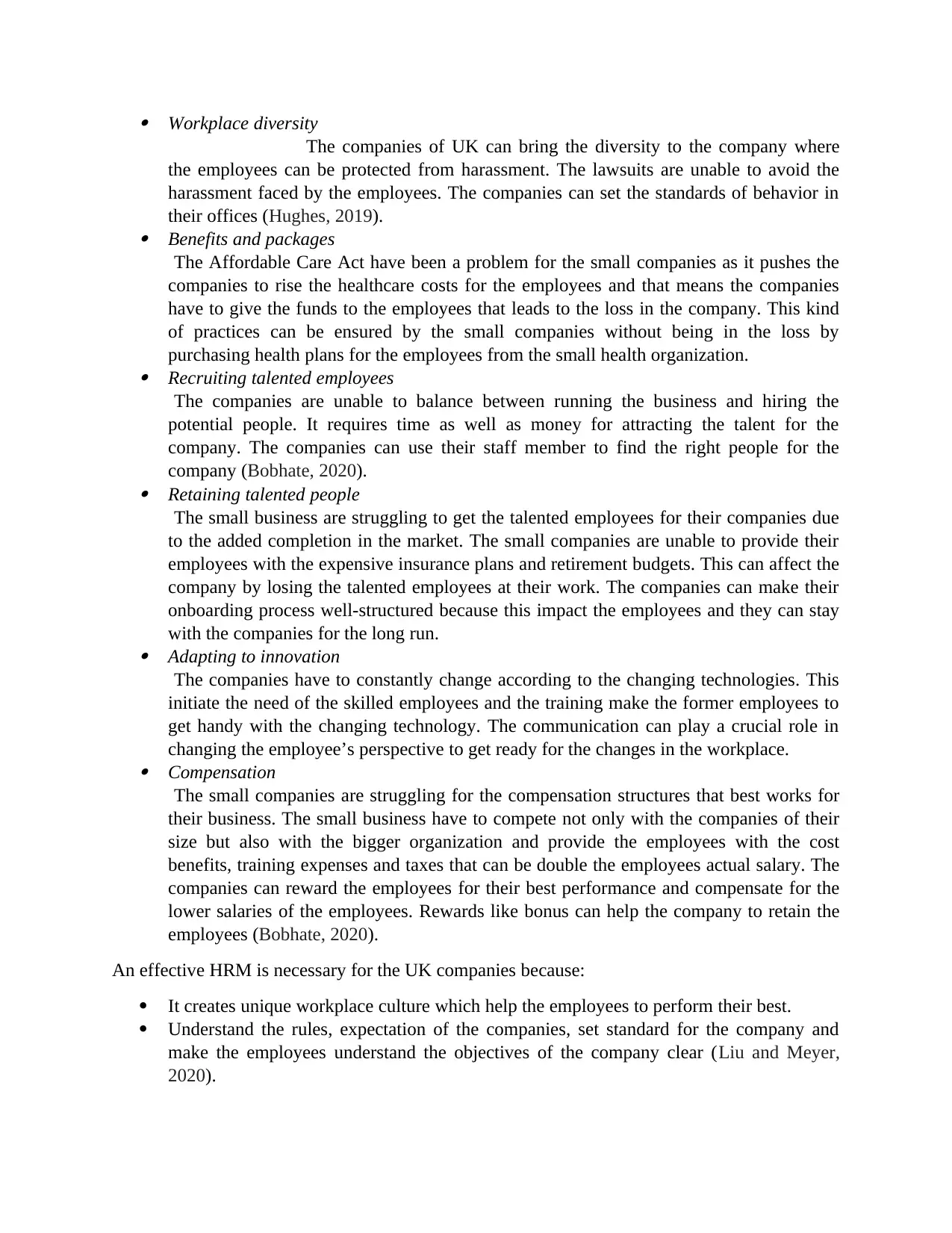
Workplace diversity
The companies of UK can bring the diversity to the company where
the employees can be protected from harassment. The lawsuits are unable to avoid the
harassment faced by the employees. The companies can set the standards of behavior in
their offices (Hughes, 2019).
Benefits and packages
The Affordable Care Act have been a problem for the small companies as it pushes the
companies to rise the healthcare costs for the employees and that means the companies
have to give the funds to the employees that leads to the loss in the company. This kind
of practices can be ensured by the small companies without being in the loss by
purchasing health plans for the employees from the small health organization.
Recruiting talented employees
The companies are unable to balance between running the business and hiring the
potential people. It requires time as well as money for attracting the talent for the
company. The companies can use their staff member to find the right people for the
company (Bobhate, 2020).
Retaining talented people
The small business are struggling to get the talented employees for their companies due
to the added completion in the market. The small companies are unable to provide their
employees with the expensive insurance plans and retirement budgets. This can affect the
company by losing the talented employees at their work. The companies can make their
onboarding process well-structured because this impact the employees and they can stay
with the companies for the long run.
Adapting to innovation
The companies have to constantly change according to the changing technologies. This
initiate the need of the skilled employees and the training make the former employees to
get handy with the changing technology. The communication can play a crucial role in
changing the employee’s perspective to get ready for the changes in the workplace.
Compensation
The small companies are struggling for the compensation structures that best works for
their business. The small business have to compete not only with the companies of their
size but also with the bigger organization and provide the employees with the cost
benefits, training expenses and taxes that can be double the employees actual salary. The
companies can reward the employees for their best performance and compensate for the
lower salaries of the employees. Rewards like bonus can help the company to retain the
employees (Bobhate, 2020).
An effective HRM is necessary for the UK companies because:
It creates unique workplace culture which help the employees to perform their best.
Understand the rules, expectation of the companies, set standard for the company and
make the employees understand the objectives of the company clear (Liu and Meyer,
2020).
The companies of UK can bring the diversity to the company where
the employees can be protected from harassment. The lawsuits are unable to avoid the
harassment faced by the employees. The companies can set the standards of behavior in
their offices (Hughes, 2019).
Benefits and packages
The Affordable Care Act have been a problem for the small companies as it pushes the
companies to rise the healthcare costs for the employees and that means the companies
have to give the funds to the employees that leads to the loss in the company. This kind
of practices can be ensured by the small companies without being in the loss by
purchasing health plans for the employees from the small health organization.
Recruiting talented employees
The companies are unable to balance between running the business and hiring the
potential people. It requires time as well as money for attracting the talent for the
company. The companies can use their staff member to find the right people for the
company (Bobhate, 2020).
Retaining talented people
The small business are struggling to get the talented employees for their companies due
to the added completion in the market. The small companies are unable to provide their
employees with the expensive insurance plans and retirement budgets. This can affect the
company by losing the talented employees at their work. The companies can make their
onboarding process well-structured because this impact the employees and they can stay
with the companies for the long run.
Adapting to innovation
The companies have to constantly change according to the changing technologies. This
initiate the need of the skilled employees and the training make the former employees to
get handy with the changing technology. The communication can play a crucial role in
changing the employee’s perspective to get ready for the changes in the workplace.
Compensation
The small companies are struggling for the compensation structures that best works for
their business. The small business have to compete not only with the companies of their
size but also with the bigger organization and provide the employees with the cost
benefits, training expenses and taxes that can be double the employees actual salary. The
companies can reward the employees for their best performance and compensate for the
lower salaries of the employees. Rewards like bonus can help the company to retain the
employees (Bobhate, 2020).
An effective HRM is necessary for the UK companies because:
It creates unique workplace culture which help the employees to perform their best.
Understand the rules, expectation of the companies, set standard for the company and
make the employees understand the objectives of the company clear (Liu and Meyer,
2020).
⊘ This is a preview!⊘
Do you want full access?
Subscribe today to unlock all pages.

Trusted by 1+ million students worldwide
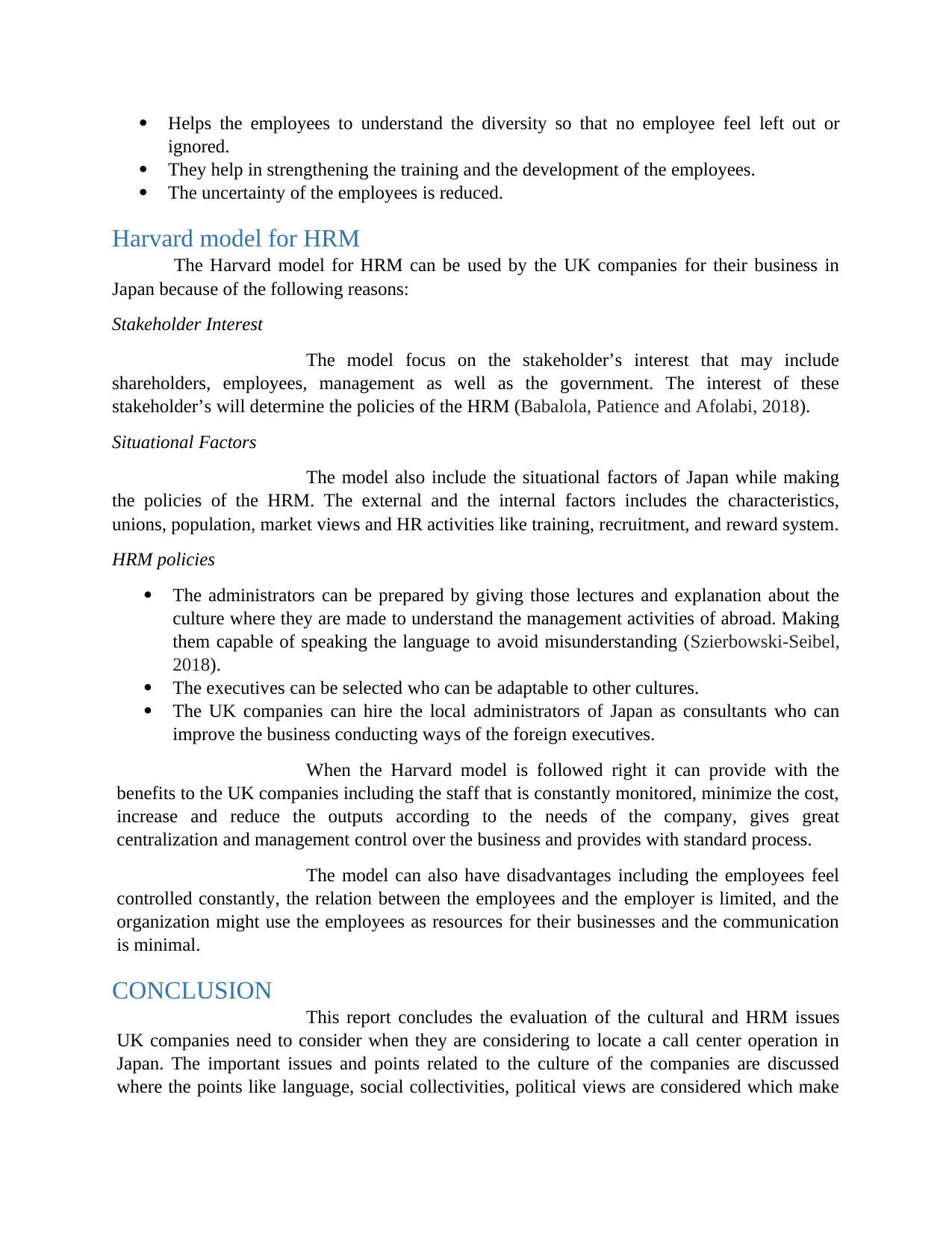
Helps the employees to understand the diversity so that no employee feel left out or
ignored.
They help in strengthening the training and the development of the employees.
The uncertainty of the employees is reduced.
Harvard model for HRM
The Harvard model for HRM can be used by the UK companies for their business in
Japan because of the following reasons:
Stakeholder Interest
The model focus on the stakeholder’s interest that may include
shareholders, employees, management as well as the government. The interest of these
stakeholder’s will determine the policies of the HRM (Babalola, Patience and Afolabi, 2018).
Situational Factors
The model also include the situational factors of Japan while making
the policies of the HRM. The external and the internal factors includes the characteristics,
unions, population, market views and HR activities like training, recruitment, and reward system.
HRM policies
The administrators can be prepared by giving those lectures and explanation about the
culture where they are made to understand the management activities of abroad. Making
them capable of speaking the language to avoid misunderstanding (Szierbowski-Seibel,
2018).
The executives can be selected who can be adaptable to other cultures.
The UK companies can hire the local administrators of Japan as consultants who can
improve the business conducting ways of the foreign executives.
When the Harvard model is followed right it can provide with the
benefits to the UK companies including the staff that is constantly monitored, minimize the cost,
increase and reduce the outputs according to the needs of the company, gives great
centralization and management control over the business and provides with standard process.
The model can also have disadvantages including the employees feel
controlled constantly, the relation between the employees and the employer is limited, and the
organization might use the employees as resources for their businesses and the communication
is minimal.
CONCLUSION
This report concludes the evaluation of the cultural and HRM issues
UK companies need to consider when they are considering to locate a call center operation in
Japan. The important issues and points related to the culture of the companies are discussed
where the points like language, social collectivities, political views are considered which make
ignored.
They help in strengthening the training and the development of the employees.
The uncertainty of the employees is reduced.
Harvard model for HRM
The Harvard model for HRM can be used by the UK companies for their business in
Japan because of the following reasons:
Stakeholder Interest
The model focus on the stakeholder’s interest that may include
shareholders, employees, management as well as the government. The interest of these
stakeholder’s will determine the policies of the HRM (Babalola, Patience and Afolabi, 2018).
Situational Factors
The model also include the situational factors of Japan while making
the policies of the HRM. The external and the internal factors includes the characteristics,
unions, population, market views and HR activities like training, recruitment, and reward system.
HRM policies
The administrators can be prepared by giving those lectures and explanation about the
culture where they are made to understand the management activities of abroad. Making
them capable of speaking the language to avoid misunderstanding (Szierbowski-Seibel,
2018).
The executives can be selected who can be adaptable to other cultures.
The UK companies can hire the local administrators of Japan as consultants who can
improve the business conducting ways of the foreign executives.
When the Harvard model is followed right it can provide with the
benefits to the UK companies including the staff that is constantly monitored, minimize the cost,
increase and reduce the outputs according to the needs of the company, gives great
centralization and management control over the business and provides with standard process.
The model can also have disadvantages including the employees feel
controlled constantly, the relation between the employees and the employer is limited, and the
organization might use the employees as resources for their businesses and the communication
is minimal.
CONCLUSION
This report concludes the evaluation of the cultural and HRM issues
UK companies need to consider when they are considering to locate a call center operation in
Japan. The important issues and points related to the culture of the companies are discussed
where the points like language, social collectivities, political views are considered which make
Paraphrase This Document
Need a fresh take? Get an instant paraphrase of this document with our AI Paraphraser
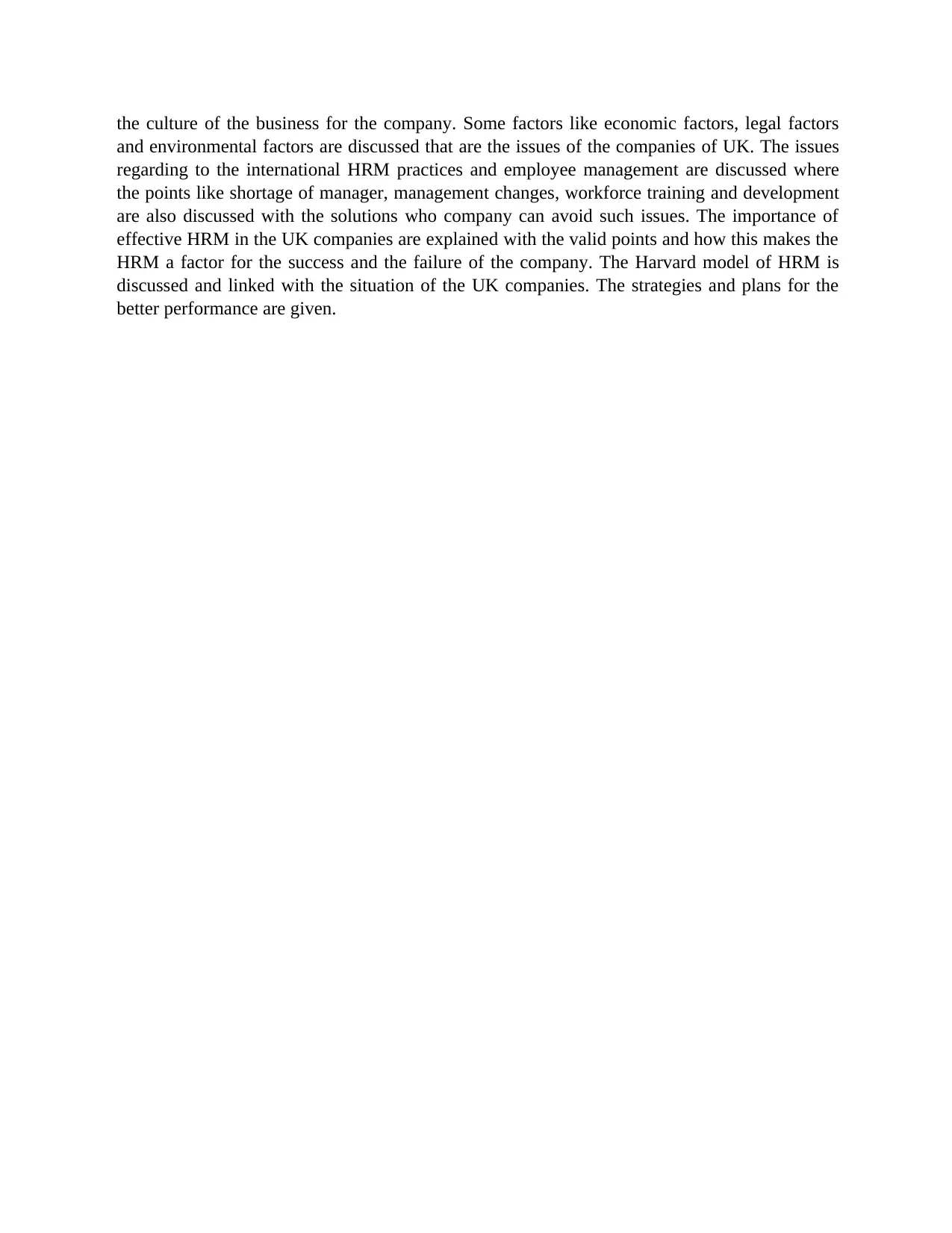
the culture of the business for the company. Some factors like economic factors, legal factors
and environmental factors are discussed that are the issues of the companies of UK. The issues
regarding to the international HRM practices and employee management are discussed where
the points like shortage of manager, management changes, workforce training and development
are also discussed with the solutions who company can avoid such issues. The importance of
effective HRM in the UK companies are explained with the valid points and how this makes the
HRM a factor for the success and the failure of the company. The Harvard model of HRM is
discussed and linked with the situation of the UK companies. The strategies and plans for the
better performance are given.
and environmental factors are discussed that are the issues of the companies of UK. The issues
regarding to the international HRM practices and employee management are discussed where
the points like shortage of manager, management changes, workforce training and development
are also discussed with the solutions who company can avoid such issues. The importance of
effective HRM in the UK companies are explained with the valid points and how this makes the
HRM a factor for the success and the failure of the company. The Harvard model of HRM is
discussed and linked with the situation of the UK companies. The strategies and plans for the
better performance are given.
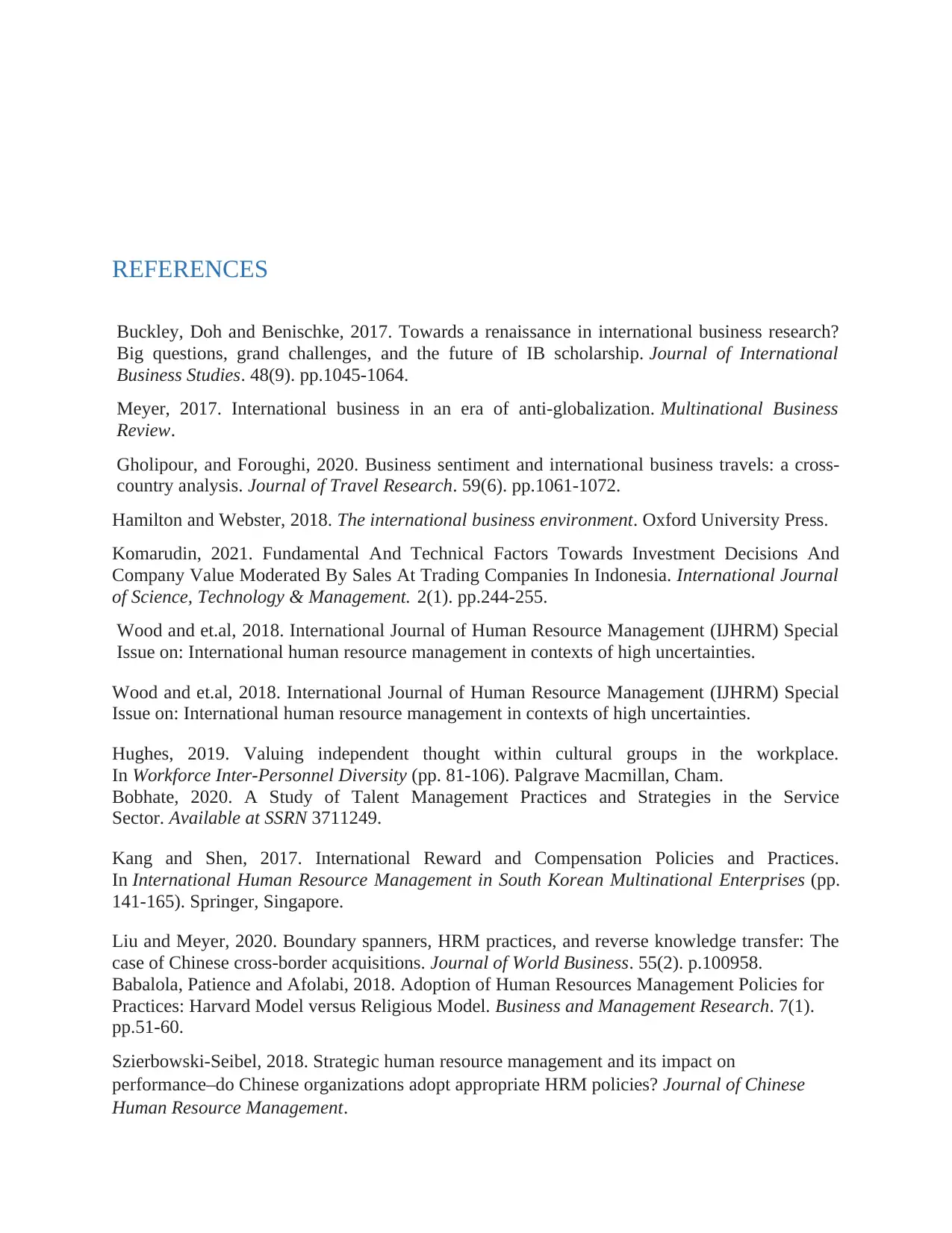
REFERENCES
Buckley, Doh and Benischke, 2017. Towards a renaissance in international business research?
Big questions, grand challenges, and the future of IB scholarship. Journal of International
Business Studies. 48(9). pp.1045-1064.
Meyer, 2017. International business in an era of anti-globalization. Multinational Business
Review.
Gholipour, and Foroughi, 2020. Business sentiment and international business travels: a cross-
country analysis. Journal of Travel Research. 59(6). pp.1061-1072.
Hamilton and Webster, 2018. The international business environment. Oxford University Press.
Komarudin, 2021. Fundamental And Technical Factors Towards Investment Decisions And
Company Value Moderated By Sales At Trading Companies In Indonesia. International Journal
of Science, Technology & Management. 2(1). pp.244-255.
Wood and et.al, 2018. International Journal of Human Resource Management (IJHRM) Special
Issue on: International human resource management in contexts of high uncertainties.
Wood and et.al, 2018. International Journal of Human Resource Management (IJHRM) Special
Issue on: International human resource management in contexts of high uncertainties.
Hughes, 2019. Valuing independent thought within cultural groups in the workplace.
In Workforce Inter-Personnel Diversity (pp. 81-106). Palgrave Macmillan, Cham.
Bobhate, 2020. A Study of Talent Management Practices and Strategies in the Service
Sector. Available at SSRN 3711249.
Kang and Shen, 2017. International Reward and Compensation Policies and Practices.
In International Human Resource Management in South Korean Multinational Enterprises (pp.
141-165). Springer, Singapore.
Liu and Meyer, 2020. Boundary spanners, HRM practices, and reverse knowledge transfer: The
case of Chinese cross-border acquisitions. Journal of World Business. 55(2). p.100958.
Babalola, Patience and Afolabi, 2018. Adoption of Human Resources Management Policies for
Practices: Harvard Model versus Religious Model. Business and Management Research. 7(1).
pp.51-60.
Szierbowski-Seibel, 2018. Strategic human resource management and its impact on
performance–do Chinese organizations adopt appropriate HRM policies? Journal of Chinese
Human Resource Management.
Buckley, Doh and Benischke, 2017. Towards a renaissance in international business research?
Big questions, grand challenges, and the future of IB scholarship. Journal of International
Business Studies. 48(9). pp.1045-1064.
Meyer, 2017. International business in an era of anti-globalization. Multinational Business
Review.
Gholipour, and Foroughi, 2020. Business sentiment and international business travels: a cross-
country analysis. Journal of Travel Research. 59(6). pp.1061-1072.
Hamilton and Webster, 2018. The international business environment. Oxford University Press.
Komarudin, 2021. Fundamental And Technical Factors Towards Investment Decisions And
Company Value Moderated By Sales At Trading Companies In Indonesia. International Journal
of Science, Technology & Management. 2(1). pp.244-255.
Wood and et.al, 2018. International Journal of Human Resource Management (IJHRM) Special
Issue on: International human resource management in contexts of high uncertainties.
Wood and et.al, 2018. International Journal of Human Resource Management (IJHRM) Special
Issue on: International human resource management in contexts of high uncertainties.
Hughes, 2019. Valuing independent thought within cultural groups in the workplace.
In Workforce Inter-Personnel Diversity (pp. 81-106). Palgrave Macmillan, Cham.
Bobhate, 2020. A Study of Talent Management Practices and Strategies in the Service
Sector. Available at SSRN 3711249.
Kang and Shen, 2017. International Reward and Compensation Policies and Practices.
In International Human Resource Management in South Korean Multinational Enterprises (pp.
141-165). Springer, Singapore.
Liu and Meyer, 2020. Boundary spanners, HRM practices, and reverse knowledge transfer: The
case of Chinese cross-border acquisitions. Journal of World Business. 55(2). p.100958.
Babalola, Patience and Afolabi, 2018. Adoption of Human Resources Management Policies for
Practices: Harvard Model versus Religious Model. Business and Management Research. 7(1).
pp.51-60.
Szierbowski-Seibel, 2018. Strategic human resource management and its impact on
performance–do Chinese organizations adopt appropriate HRM policies? Journal of Chinese
Human Resource Management.
⊘ This is a preview!⊘
Do you want full access?
Subscribe today to unlock all pages.

Trusted by 1+ million students worldwide

1 out of 10
Related Documents
Your All-in-One AI-Powered Toolkit for Academic Success.
+13062052269
info@desklib.com
Available 24*7 on WhatsApp / Email
![[object Object]](/_next/static/media/star-bottom.7253800d.svg)
Unlock your academic potential
Copyright © 2020–2026 A2Z Services. All Rights Reserved. Developed and managed by ZUCOL.





